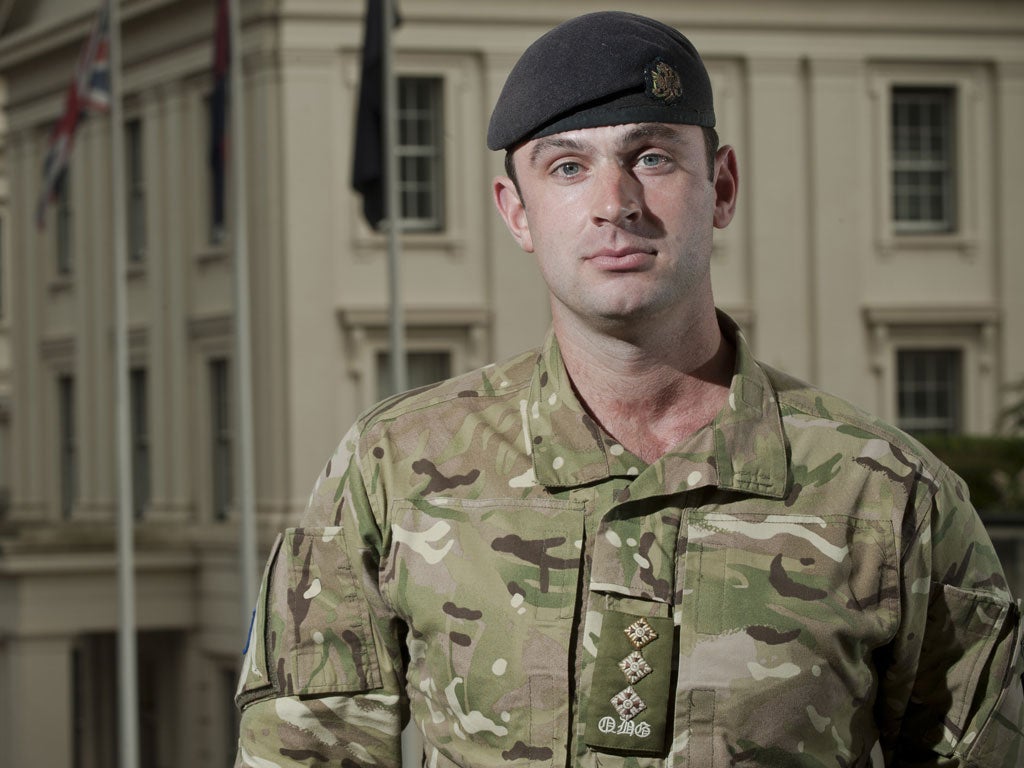Honour for soldier who lost six pints of blood but came back to front line
Officer who almost died in grenade attack leads list of awards as British forces draw down

The rocket propelled grenade exploded in front of Nicholas Garland's face, flying pieces of shrapnel cutting into his body.
He turned to the soldier next to him to make sure he was alright before realising there was blood sprouting out of his own throat. Looking down he saw a dark red pool around his feet and remembered thinking “all that can't be mine”.
The flow continued despite all the efforts of the medical team to stop it; Captain Garland lost six and half pints of blood out of around ten pints someone of his size would have in the body; he was pronounced dead on board the helicopter used to evacuate him from the frontline of Musa Qala before he could get to the hospital in Camp Bastion.
Slices of burning metal had gone into his windpipe, thyroid, artery and lung and the 25 year old soldier had to be defibrillated before slipping into a coma which last four weeks. But Captain Garland survived and overcame his terrible injuries not only to stay in the Army but return to duty in Helmand and taking part in more than 50 combat operations.
There, in January this year, his action under intense fire from three locations, helped save the lives of the men under his command and drove back attacking Taliban fighters.
He received a Mention In Despatches, with a citation stating that what took place “is just one example of Garland's unwavering bravery and cool-thinking which has inspired his soldiers in the most hostile of environments, as he consistently sough to take the fight to the enemy.”
The officer from the Queen's Dragoon Guards was one of over a hundred service personnel from 20 Armoured Brigade following their deployment in Afghanistan. The ceremony, a quiet and reflective occasion, takes place as British and Nato forces draw down and begin to end their combat operations in the 11 year long war amid uncertainties about what lies ahead.
Captain Garland has been fighting his own personal war to recover physically and mentally from what happened four years ago. He has undergone extensive surgery, but there are continuing after-effects from his wounds. One problem, he said, was that “they have had to basically had to modify my blood supply so that instead of there being a direct link between my heart and my left arm, it has been re-routed through my brain. As a result there is a constant throbbing pain in my arm and lack of supply means it is very uncomfortable when it gets cold.
“I used to recall what happened to six or seven times a day at the beginning, but it has slowly faded away, I don't have any negative thoughts about it at all any longer.”
He was, however, determined not to let the problems stop him from returning the frontline. His wife “wasn't exactly over the Moon about this” but has fully supported his decision. Of the action which led him being in the honours list, Captain Garland said “It was a matter of basically countering pretty accurate fire and then pushing forward to neutralise the enemy. I didn't think once about the previous incident when this was going on, one has to remember I am hardly the only man to be injured in Afghanistan.”
Rifleman Matthew Wilson received the Military Cross for protecting a fallen comrade and a helicopter ferrying out the injured at great risk to himself.
The 21 year soldier from The Rifles had already been shot once in the head, the Kalashnikov round tearing around his helmet and penetrating to the last protective layer. He was unconscious for around 30 seconds before “waking up with a massive headache”. He shook his head in an attempt to clear it before rejoining the battle and moved across 50 meters of open ground continuing to fire so that the injured could be airlifted out.
Sapper Ryan Pavey received a Queen's Commendation for Bravery for risking his life to help injured civilian victims of a Taliban roadside bomb. The IED (Improvised Explosive Device) had blown up minibus killing 18 passengers on board. Among those the 24 year old Royal Engineer tended was a four year old boy whose leg had been severed, but whose life was saved by the emergency medical treatment.
“We were carrying out some IED checks on the side of the road and saw the bus coming along. We tried to get it to stop, but it just went on and for about a hundred meters before the explosion” he said.
“There were the dead, body parts lying around everywhere, and four injured, an old man and four kids. I did what I could and then went the kid with what looked to be a really bad injury. It is so hard when you see kids involved in something like that, they really are the innocent. He lived, we had a whip around and got him a wheelchair, it was the least we could do.”
Subscribe to Independent Premium to bookmark this article
Want to bookmark your favourite articles and stories to read or reference later? Start your Independent Premium subscription today.

Join our commenting forum
Join thought-provoking conversations, follow other Independent readers and see their replies